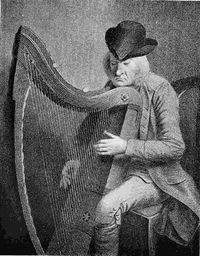Annotation:Love is a Tormenting Pain: Difference between revisions
m (Text replacement - "garamond, serif" to "sans-serif") |
No edit summary |
||
| Line 1: | Line 1: | ||
== | __NOABC__ | ||
<div class="noprint"> | |||
<p><font face="sans-serif" size="4"> Back to [[{{BASEPAGENAME}}]] </font></p> | |||
</div> | |||
---- | ---- | ||
<p><font face="sans-serif" size=" | {{#lst:{{PAGENAME}}|abc}} | ||
'''LOVE IS A TORMENTING PAIN''' ("An Cuac Deas" or "Is Galar Cráidhte an Grádh"). Irish, Air (3/4 time, "tenderly"). F Major. Standard tuning (fiddle). AAB. The Irish collector Edward Bunting states in his 1840 '''Ancient Music of Ireland''' (p. 44) that the tune was a composition from the year 1670 of the harper-composer William Connellan, whose more famous brother was the musician Thomas Connellan, although Bunting's own MS notes seem to suggest it was originally called the "[[Golden Hero]]." The Stanford-Petrie collection (1905) contains a tune entitled "[[Mo chreach is mo dhith is claoidhte an galar an gradh]]" (No. 1573), a version of this melody. O'Neill's version seems taken directly from Bunting, although he inexplicably credits himself (or his collaborator James O'Neill) for the version in '''Music of Ireland''' (1903). | ---- | ||
<div style="page-break-before:always"></div> | |||
< | <p><font face="sans-serif" size="3"> | ||
<div style="text-align:justify;"> | |||
{{break}} | |||
[[File:Denis Hempson.jpg|200px|thumb|left|Denis Hempson]] | |||
'''LOVE IS A TORMENTING PAIN''' ("An Cuac Deas" or "Is Galar Cráidhte an Grádh"). Irish, Air (3/4 time, "tenderly"). F Major. Standard tuning (fiddle). AAB. The Irish collector Edward Bunting states in his 1840 '''Ancient Music of Ireland''' (p. 44) that the tune was a composition from the year 1670 of the harper-composer William Connellan, whose more famous brother was the musician Thomas Connellan, although Bunting's own MS notes seem to suggest it was originally called the "[[Golden Hero]]." The Stanford-Petrie collection (1905) contains a tune entitled "[[Mo chreach is mo dhith is claoidhte an galar an gradh]]" (No. 1573), a version of this melody. O'Neill's version seems taken directly from Bunting, although he inexplicably credits himself (or his collaborator James O'Neill) for the version in '''Music of Ireland''' (1903). | |||
{{break|2}} | |||
</div> | |||
</font></p> | </font></p> | ||
<p><font face="sans-serif" size=" | <div class="noprint"> | ||
<p><font face="sans-serif" size="3"> '''Additional notes''' </font></p> | |||
''Source for notated version'': the Irish collector Edward Bunting (1773-1843) noted the tune from elderly harper Denis Hempson at Magilligan in 1796. | <p><font face="sans-serif" size="3"> | ||
<font color=red>''Source for notated version''</font>: - the Irish collector Edward Bunting (1773-1843) noted the tune from elderly harper Denis Hempson at Magilligan in 1796. | |||
{{break|2}} | |||
</font></p> | </font></p> | ||
<p><font face="sans-serif" size=" | <p><font face="sans-serif" size="3"> | ||
''Printed sources'': Bunting ('''Ancient Music of Ireland'''), 1840; No. 60, p. 44. O'Neill ('''Music of Ireland: 1850 Melodies'''), 1903; No. 172, p. 30. O'Sullivan/Bunting, 1983; No. 60, p. 93 (from Bunting's 1840 collection). | <font color=red>''Printed sources''</font> : - Bunting ('''Ancient Music of Ireland'''), 1840; No. 60, p. 44. O'Neill ('''Music of Ireland: 1850 Melodies'''), 1903; No. 172, p. 30. O'Sullivan/Bunting, 1983; No. 60, p. 93 (from Bunting's 1840 collection). | ||
{{break|2}} | |||
</font></p> | </font></p> | ||
<p><font face="sans-serif" size=" | <p><font face="sans-serif" size="3"> | ||
''Recorded sources'': <font color=teal></font> | <font color=red>''Recorded sources'': </font> <font color=teal> - </font> | ||
</font></p> | </font></p> | ||
{{break}} | |||
---- | ---- | ||
== | <p><font face="sans-serif" size="4"> Back to [[{{BASEPAGENAME}}]] </font></p> | ||
</div> | |||
__NOEDITSECTION__ | |||
__NOTITLE__ | |||
Revision as of 13:32, 22 November 2019
X:1 T:Love’s a Tormenting Pain M:3/4 L:1/16 R:Air C:”W. Connallon 1670” B:Bunting – Ancient Music of Ireland (1840, No. 60, p. 44) Z:AK/Fiddler’s Companion K:F "Tenderly and Gracefully"[F4A4c4]-|[F4B4d4] c3d f4|{E}.F4-.F4 F/G/A3|c4 (d2c2) (A2G2)|[F8A8] [F4c4]| [F4d4] (c3d) f4|{E}.F4.F4~G4|{FG}A8 (G/F/E3)|F8:| |:.c4|.c4 [F4A4c4] (d3e)|f8a4|f8 e4|d8 c4|c4 (d2c2)(A2c2)| d4 (c3d)(e3d)|(.e4.c4.c4)|c8 (3c2d2e2|(.f4.e4.d4)|(.c4.B4.A4)| G4 A3G F4|[F8A8] [F4c4]|[F4B4d4] (c3e) .f4]|{E}(.F4.F4.G4)|[F8A8]TG4|[C8F8]||

LOVE IS A TORMENTING PAIN ("An Cuac Deas" or "Is Galar Cráidhte an Grádh"). Irish, Air (3/4 time, "tenderly"). F Major. Standard tuning (fiddle). AAB. The Irish collector Edward Bunting states in his 1840 Ancient Music of Ireland (p. 44) that the tune was a composition from the year 1670 of the harper-composer William Connellan, whose more famous brother was the musician Thomas Connellan, although Bunting's own MS notes seem to suggest it was originally called the "Golden Hero." The Stanford-Petrie collection (1905) contains a tune entitled "Mo chreach is mo dhith is claoidhte an galar an gradh" (No. 1573), a version of this melody. O'Neill's version seems taken directly from Bunting, although he inexplicably credits himself (or his collaborator James O'Neill) for the version in Music of Ireland (1903).
